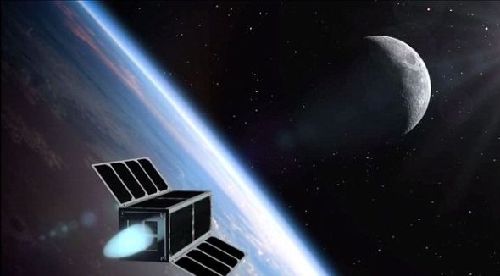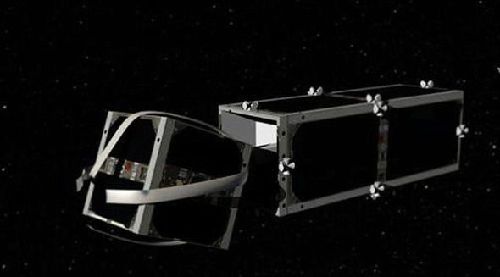Swiss scientists are developing MicroThrust, a microsatellite engine that allows the satellites to change direction when orbiting at 40,000 kilometers per hour. MicroThrust will be installed for the first time on the CleanSpace One satellite used to clean up space debris. A picture released this week shows the CleanSpace One satellite's proximity to the abandoned cube satellite. CleanSpace One is capturing space debris. Scientists hope to send this satellite into space within three to five years. CleanSpace One is responsible for sending discarded satellites into the Earth's atmosphere, allowing them to burn out as they return to Earth's atmosphere. Beijing April 1 news, according to foreign media reports, Swiss scientists are developing a micro-satellite propeller called "MicroThrust", just 0.1 liters of fuel can fly to the moon. The developer hopes MicroThrust can open a new era of low-cost space exploration. It is reported that this mini-engine is only a few hundred grams of area, the use of ion compounds as fuel, the use of electro-spray ions to generate propulsion. Soon after, the EPFL laboratory in Lausanne will announce the first prototype of the MicroThrust mini engine. In design, this kind of micro-engine is not used to put satellites into orbit, but to help satellites move in space. At present, satellites need to use heavy and expensive engines for maneuvering. Scientists hope MicroThrust can lead a new era of low-cost space exploration. The cost of microsatellites is much lower than that of large satellites, but there is currently a lack of efficient propulsion systems for such satellites. EPFL hopes that MicroThrust engine can solve this problem. This engine allows the satellite to change direction when orbiting at a speed of 40,000 kilometers per hour. Helbert-Sher of the EPFL said: "Our goal is to create a propulsion system for nanosatellites and let them maneuver in orbit." EPFL scientist Muller-Richard pointed out: "According to our calculations, a nano-satellite with a weight of 1 kilogram using our developed engine will take about 6 months to enter the lunar orbit and consume 100 ml of fuel." According to the EPFL plan, MicroThrust will be installed on the CleanSpace One satellite. At present, EPFL is developing such a satellite for cleaning up space debris. CleanSpace One, which cost 11 million U.S. dollars, was able to capture debris from the orbit and throw it into the Earth's atmosphere to burn them out as they re-entered the Earth's atmosphere. (xiaowen) Spring Washer,Stainless Spring Washer,Belleville Spring Washers Compression Springs ,Stampings,Extension Springs Co., Ltd. , http://www.ns-springs.com



